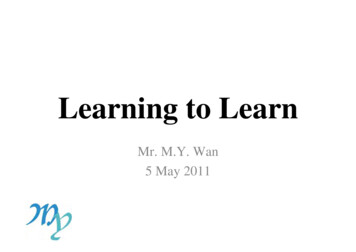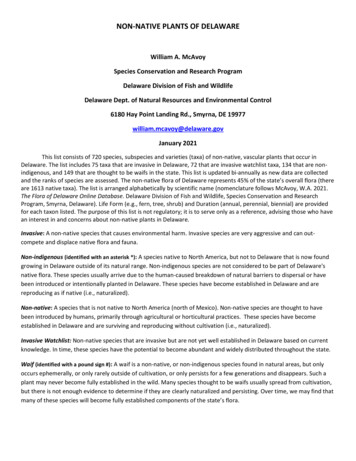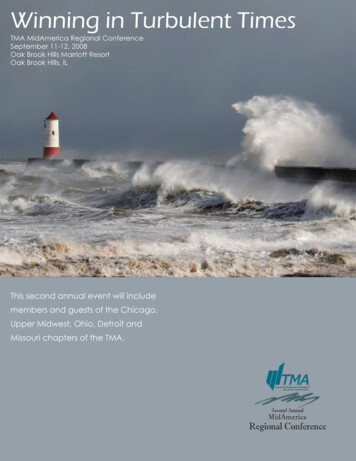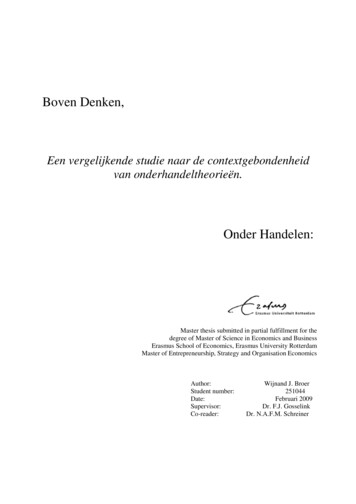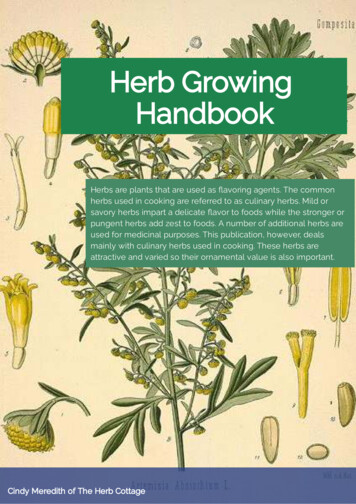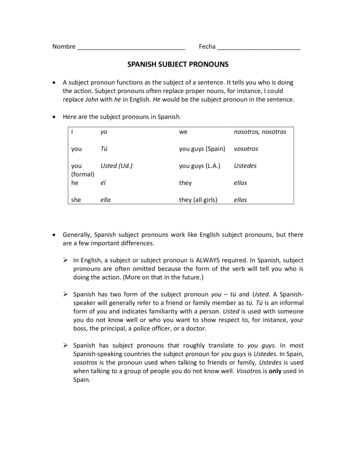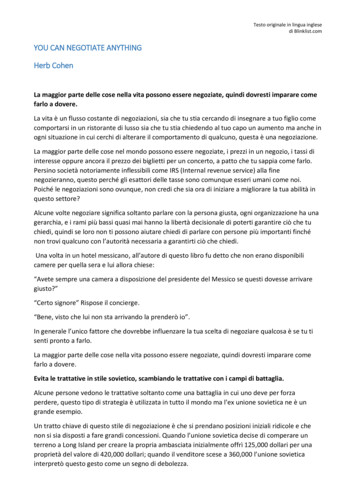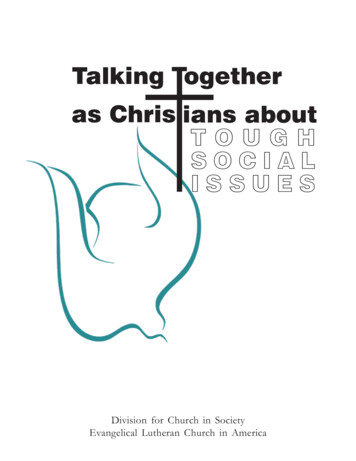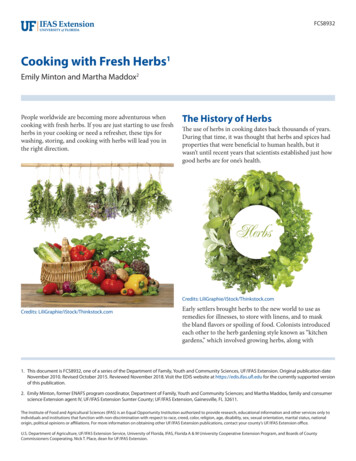
Transcription
Volume 48 Number 2March/April 20042President’s Column3What’s in a Phrase?5Highlights of JanuaryAdCom Meeting8TNew RegionalActivities Committee9E10ENet NotesRFrom the EditorTInside12Tools of the Trade14Flocci.pilification16Good Intent,Poor Outcome17Professor Grammar18ECall for AdComNominations20WSLThinking Globally,Teaching LocallyNImprove Your Acronym IQ 11ISSN 1539-3593Tough Talk from Herb Cohen:Negotiate This!By Ron NelsonWhile the line attributed to Leo Durocher, “Nice guys finish last,” 1 may not invariably be true, often enough it seems so. Conversely, mean guys win, according tothis way of seeing things. However, many “nice guys” (and “nice gals”) can anddo succeed professionally and personally as a result of various sources of strength,like an ability to observe carefully, a reflective nature, and a refusal to engage inMachiavellian activities.The physician-poet William Carlos Williams once remarked, “In my world there areno classes but the good guys and the bastards.” 2 In that comment he is guilty of thelogical fallacy known as “false dichotomy” (“Live free or die” on New Hampshirelicense plates—there are other alternatives). At the same time he identifies a fundamentally important duality that manifests itself in many forms, for example, inbehavioral patterns like Type A-Type B, active-passive, and perpetrator-victim.This kind of thinking is essentially Hegelian, that is, it is based on a thesis (e.g.,this plan is great) confronted by an antithesis (this plan is terrible), resolving itselfin a synthesis (this plan is pretty good but it has some kinks to work out). Thatsynthesis becomes a new thesis, confronted by a new antithesis, etc. ad infinitum.Hegel’s dialectic can be regarded as one of the crucial bases of learning.This admittedly philosophical introduction is important to understanding HerbCohen’s new book, Negotiate This! By Caring, But Not T-H-A-T Much (New York:Warner Business Books, 2003). With a no-nonsense yet often humorous writingstyle, Cohen articulates an interactive approach to situations that relates well tothe role of the professional communicator and to communication in general. It istantamount to a philosophy of life worthy of study, since it offers valuable insightsinto the important question: How best to conduct myself in any given situation,professional or otherwise? The answer to that question involves nurturing a combination of gentleness and toughness, as well as caring about things but putting theminto perspective.In this book—a follow-up to You Can Negotiate Anything (1980)—Cohen presentssound advice for steeling the self with strengths, in effect tempering niceness toavoid being a pushover, while fostering a sense of self-respect and cooperation.The result is effective communication.(continued on page 6)1For two somewhat conflicting versions of the origin of the line “from The Lip’s mouth,” so to speak, see Leo Durocher (withEd Linn), Nice Guys Finish Last (New York: Simon and Schuster, 1975, pp. 13-14) and Gerald Eskenazi, The Lip: A Biographyof Leo Durocher (New York: William Morrow, 1993, p.229).2Linda Wagner, ed., Interviews with William Carlos Williams (New York: New Directions, 1976, p. 83)
NewsletterFrom the EditorMarch/April 2004Rudy JoenkThis IssueWe welcome a new column, ThinkingGlobally, Teaching Locally, by KirkSt.Amant. The author focuses ontechniques for teaching studentsabout culture and communication.In his first article he uses the Internetto illustrate cross-cultural differences(page 12).I’m always interested in receivingproposals for single articles or columns. See the information for authorsfarther along in this column.AdComThis year the AdCom convened byconference call on 24-25 January(see the meeting summary on page8), and will meet in Philadelphia,Pennsylvania, 21-22 May, andafter IPCC 2004 in Minneapolis,Minnesota, 2-3 October. PCS members are always welcome at AdCommeetings.HistoryIn my note about AdCom meetings inthe January/February issue I neglectedto mention that complementary to thereduction to three from four annualmeetings in the early 1990s was theintroduction of two-day meetings.messages on its Vaio computers withJapanese haiku.PotpourriRemember the “slithy toves”? EdMcBain, author of the 87th Precinctmystery novels, has reached into thesecond verse of Lewis Carroll’s poemJabberwocky for the title of his newbook: Frumious Bandersnatch.In January the American Dialect Society (http://americandialect.org) postedits words (or phrases) of the year:Inspired by the appearance ofcrapulent in A.Word.A.Day, MarkStenglein created this celebration ofholiday meals: “This succulent andopulent food and poculent wine isleading to crapulence, corpulence,and flatulence.” AWADmail issue28 January 2004.Computer HaikuA crash reducesYour expensive computerTo a simple stone.Three things are certain:Death, taxes, and lost data.Guess which has occurred.There’s more at http://www.funny2.com/haiku.htm; seems like Sony hasreplaced some of the Microsoft errorWord of the year: metrosexual, afashion conscious heterosexual maleMost useful: flexitarian, a vegetarianwho occasionally eats meatMost creative: freegan, people whoeat only what they can get for freeMost euphemistic: pre-emptive selfdefense, an attack made before apossible attackEats, Shoots & Leaves by LynneTruss has become a bestseller inBritain. This humorous guide topunctuation will be published hereby Gotham Books in April.If you haven’t seen enough examplesof misused quotation marks, visithttp://www.juvalamu.com/qmarks/.Colorado Daily, 26-28 December2003.Readers of the Feedback section ofNew Scientist were invited to invent(continued on page 4)IEEE ProfessionalCommunicationSocietyOfficersEd Clark, PresidentLuke Maki, Vice PresidentKirk St.Amant, SecretarySteve Robinson, TreasurerStaffRudy Joenk, Editor2 PCS IEEE Professional Communication Society Newsletter is published bimonthly by the ProfessionalCommunication Society of the Institute of Electrical and Electronics Engineers, Inc., 3 Park Avenue,New York, NY 10016. One dollar per member per year is included in the society fee for each member ofthe Professional Communication Society. Printed in U.S.A. Periodicals postage paid at New York, NY,and at additional mailing offices. Copyright 2004 IEEE: Permission to copy without fee all or part of any material without a copyrightnotice is granted provided that the copies are not made or distributed for commercial advantage and thetitle of this publication and its date appear on each copy. To copy material with a copyright notice requiresspecific permission; direct inquiries or requests to the copyright holder as indicated in the article. Postmaster: Send address changes to IEEE Professional Communication Society Newsletter, IEEE,445 Hoes Lane, Piscataway, NJ 08855. Editorial correspondence: Rudy Joenk, 2227 Canyon Blvd. #462, Boulder, CO 80302-5680, 1 303 541 0060, rjjoenkatcomcastdotnet. Articles, letters, reviews, and proposals for columns are welcome.
NewsletterPresident’s ColumnVolume 48 Number 2Eduardo H. ClarkTaking Care of BusinessIf you read my inaugural column inthe January/February issue of thisNewsletter, you may remember mybeing concerned with our many challenges ahead. And, you probablyasked yourself, what is the PCS leadership doing about them? Well, I’mglad you asked, because that is thetopic of this column.Financial wizardry consists basicallyof a good combination of two things:increasing revenues and decreasingexpenditures, and that is not exactlyrocket science. I believe that BillGates once said that the concept of“revenues minus expenditures equalsprofit” is so obvious that manypeople just don’t get it. Well, restassured, your PCS leadership graspedthis concept long ago and, althoughas part of the IEEE, a 501(c)(3) organization, we cannot have profits,we can use a little surplus in ourreserves to fund initiatives or to facedifficult times.As you may know, our revenues consist primarily of membership dues,conference surplus, and royaltiesfrom our intellectual property, that is,the publications and their electronicversions on Xplore. These revenuescan grow only by meeting the expectations of our members and the publicat large. If we attract (and retain)members, the dues revenue increases;if our conferences are attractive toour audience (within and outside theIEEE), we get a surplus; and, luckily,our publications produce meaningfulroyalties because of their high intellectual value and quality.ness, including voting, using e-mail,On the expenses side, we started cutting back long ago, at least in thosesomething that our predecessors didareas over which we have direct connot have just a couple of decades ago.trol. As for the infrastructure servicesIn 2000 we experimented with yetprovided by the IEEE, currently weanother cost-saving idea: virtualpay only for what we use based onmeetings. We met using electronicthe new IEEE financial model. Themedia: NetMeeting and a free teleAdCom used to have more membersphone connection, courtesy of a corand the meetings used to be more freporate sponsor. Since then we havequent. The meetings were all in-perrepeated the teleconference each yearson and, for most AdCom members,at around the end of January. Weinvolved travel expenses that werehave saved not only money, but alsoonly partially subsidized by PCS withthe canceled flights, delays, andan annual amount to be split amongthe meetings. Some members actually inconvenience of traveling in themiddle of winter.got rewarded for not attending allmeetings by having the full subsidyAs meetings chair last year I orgafor fewer meetings, but those werenized the virtual meeting in Januaryvery few. I understand thatusing the IEEE’s serviceother (larger) IEEE societiesalliance with PlaceWare. ThatOurare more generous with theirsubsidies (e.g., full reimpublications virtual experience was muchbetter than with NetMeetingbursement). However, Iproducebecause we could do onlineremember meetings whenmeaningfulpolling, have recording capaI and many of my fellowroyalties.bility, share applications,AdCom members had to payand display PowerPointa good portion of our travelslidestokeep everybody focusedexpenses ourselves, or rely on ouronthetask.You, too, can use thisemployers for financial assistance.service for your meetings with otherEffective in 1998 the AdCom wasIEEE members. From the http://reduced from 21 to 18 members.www.ieee.org portal, select VolunAlso, the meetings were eventuallyteer Resources and then Internetreduced from the five or six a yearConferencing (under Electronicin the early days of PCS to the curWeb Services).rent three, with one coinciding withOur first meeting of 2004 (24-25the annual conference. With theseJanuary) probably cost only USD 50changes we saved on travel expendifor the PlaceWare setup fee, againtures but also created additional workthanks to a free telephone connectionfor the smaller AdCom and ended upwith less time to run PCS business.courtesy of a corporate sponsor. IFortunately, technology has helped.don’t think that we can have meetingsWe now conduct a lot of routine busi- any cheaper than that.3
NewsletterPresident’s ColumnOn the revenue side, we cannot positively impact our finances in the shortterm. Based on the feedback from theIEEE membership research project,however, we intend to continue offering value to current and prospectivemembers. As our membership growsand our conferences attract participation, we will earn the resourcesto maintain a healthy financial situation. We had to raise PCS dues for2003 and we have to revisit the issueagain for 2005. We must find outif what we receive in dues and publi-cation royalties is enough to coverthe cost of the value that we provideto members.In contrast with larger IEEE societiesthat have executive directors and paidstaff, we at PCS rely exclusively onvolunteers. It is the AdCom memberswho chair most of the committeesand run all PCS activities. We occasionally get volunteers outside theAdCom to chair conferences, andwhen they do they become ex-officio members of the AdCom. So,in essence, PCS business is doneMarch/April 2004exclusively by (AdCom at-large orex-officio) volunteer members.As you can see, the AdCom is takingcaring of business and using ourresources frugally. Now, if we canonly grow in double digits this yearby reaching the IEEE memberswho haven’t yet heard of us, we canbecome a significant presence withinthe IEEE. However, I don’t think thatwe will ever hire an executive director. They are just too expensive and well, volunteers (like your AdCommembers) work for you for free!From the Editor(continued from page 2)and define new scientific words.Among the winners (20 December2003) are:Julane Marx in World Wide Words,20 December 2003.Coyotus Interruptus A momentarysuspension of the law of gravity as experienced by Wile E. Coyote .Jacqueline Jaeger Houtman, Madison,Wisconsin.The Washington Post asked people to(1) change one letter, (2) delete oneletter, and (3) add one letter to agiven word and provide definitionsfor the results. One of the winners forthe word newspaper is (30 November2003) Milo Sauer, Fairfax, Virginia:Monotologue A lecture or presentation delivered by one person on one subject with oneDeadlines areviewpoint in one tone andthe 15th of theone rhythm. Jim Watt,odd-numberBirmingham, U.K.months.Terarist Presenter whointimidates his audience with largenumbers. David Craig, Edinburgh,U.K.Seen in a career e-newsletter: an article titled “Tell ’em Your a Writer.”4Newsparer: an editor forThe ExpressEwspaper: The NationalEnquirerNewspamper: A low-costdiaper substituteSome good non-three-pack examplesare Redskeins, strings of consecutivelosses; Mountainfop, a hillwilliam;and Mantique, an item a guy keepsfrom his bachelor days.In Language Visible David Sacksdescribes the evolution of each letterof the alphabet through variousalphabet systems and shapes andexplains some of the associationseach letter has had to people pastand present. World Wide Words, 18October 2003.Language, n. The music with whichwe charm the serpents guardinganother’s treasure. Twice, adv., Oncetoo often. Ambrose Bierce in TheDevil’s Dictionary.Presently, adv., doesn’t mean nowor at present. It means soon, beforelong, any minute (hour, day) now,forthwith, shortly, keep your shirton, faster than you can say JackRobinson, or when I’m darn goodand ready. Patricia T. O’Conner inWoe Is I.
NewsletterVolume 48 Number 2What’s in a Phrase?By Brad Connatser“Sixty zippers were quickly pickedfrom the woven jute bag” is a pangram or holalphabetic sentence(contains all letters of the alphabet).“Some men interpret nine memos”is a palindrome (reads the samebackward as forward). Schott’sOriginal Miscellany; see the reviewby Michael Brady on page 16.Information for AuthorsOne thousand words makes a nicepage-and-a-half article, though longerand shorter articles may be appropriate. Proposals for periodic columnsare also welcome. Write about whatyou know, things that you’re familiar with. If you live outside NorthAmerica, consider writing abouttechnical communication in yourcountry. You needn’t be a PCSmember to contribute.If you use a wp program, keep yourformatting simple; multiple fontsand sizes, customized paragraphingand line spacing, personalized styles,etc. have to be filtered out beforebeing recoded in Newsletter style.Headers, footers, and tables lead thecasualty list. Embed only enoughformatting and highlighting (boldface, italics, bullets) to show meyour preferences.If you borrow text—more than afair-use sentence or two—from previously published material, you areresponsible for obtaining writtenpermission for its use. Ditto forgraphics. Always give credit to theauthor or artist.An idiom is “an expression of a given indicates a lack of creativity. It is truelanguage that is peculiar to itselfthat in some cases (writing for peogrammatically or cannot be underple who do not speak English verystood from the individual meaningswell, for example) idioms should beavoided, but in many cases a judiciousof its elements, as in ‘keep tabs on’”application of idioms is(http://dictionary.reference.com/search?q idiom).perfectly acceptable. ForIdioms have aThe meaning of an idiomexample, when the goal ofway of relaxingis derived from the entirewriting is to communicatethe formalityphrase, which containsinformation—and not toof language.words that we may or mayimpress the reader with crenot know. For example,ative language—idiomswhen we say, “warm the cockles ofhave a way of relaxing the formalityyour heart,” “tit for tat,” or “vestedof language. Informal language, suchinterest,” we may not know the words as idioms and sayings, has a way ofadding spirit to the lifeless language“cockles,” “tit,” “tat,” or “vested” butwe commonly use to present facts.still understand the complete phrasesthat contain them.Some idioms are evolving into aneven less formal configuration. ForSome books on technical communication issue a blanket warning toexample, consider the idiom “as farwriters to steer clear of idioms, espeas x is concerned.” I’ve noticed thatcially clichés. Why? Because, accord- the media are prone to leaving offing to the authors, relying on idiomsthe second part of the idiom, “is con(continued on page 13)The Newsletter issues on our Website (http://www.ieeepcs.org/activities publications newsletter.php)can be used as examples. Issues areposted about one month after distribution of the print version and nowhave active e-mail, Web, and tableof-contents links.I prefer to receive articles by e-mail;most WordPerfect, Word, RTF (richtext format), and ASCII files areacceptable. My addresses are in theboilerplate at the bottom of p. 2 alongwith our copyright notice.DeadlinesThe 15th day of each odd-numbermonth is the deadline for publication in the succeeding odd-numbermonth. For example, the deadline is15 May for the July/August issue, 15July for the September/October issue,etc. You won’t be far off (and neverlate) if you observe the Ides of May,July, September, and so on.5
NewsletterMasters of StyleMarch/April 2004Negotiate This!(continued from page 1)The ploys that he employs to achievehis ends include, but are not limitedto, (1) a comfortable diction level, (2)a self- effacing quality that subordinates ego to the greater goal of understanding a situation, (3) phrasing thatcontains a certain gravitas yet is notoverbearing, (4) a sense of humorthat frequently emerges in the formof unexpected wording, (5) a creativeuse of language in the form of neologisms, (6) an ability to encapsulatethe essence of content—to abstractthe information—in the forms ofchapter titles and summarizing pointsat the end of chapters, (7) apt anecdotes and examples from his ownextensive experience, (8) appositequotations and allusions that lendcredibility to the subject, (9) metadiscourse that unobtrusively yet interactively signals the reader as to what isto come, and (10) an inclination tochallenge commonly held but misleading beliefs. These strategies areof course not mutually exclusive,techniques often being interwoven.Cohen’s comfortable diction levelcomes out everywhere. Early in6the book he says, “ I believe myto transform “an adversary into anally” (p. 44). In other words, “a softermanner of expression is somewhatdemeanor can favorably affect theimpressionistic, in that I tend to sugnegotiating climate” (p. 45).gest rather than state. As it is, I’mmore comfortable describing, ratherHis phrasing has a rich contentthan prescribing, behavior” (p. xvi).throughout but it is not expressedHis use of “I believe,” “somewhat,”ponderously. For example,“tend,” and the contractionhe reminds the reader that“I’m” contribute to hisDo I emerge“ human beings respondease of expression. Anfrom it gratified to events as they perceiveappropriate amount ofthem, not necessarily toafter havinghedging (not overdone)objective reality” (p. 167).read it andoffers a subtle force thatAt another juncture hecan dissipate overlywiser forasserts, “And the roadaggressive, threateninghaving done so? toward fulfillment lies inlanguage.questioning everything,The entire book exudesCohen’s humility, a self-effacingquality that is not only admirable(Gandhi, Albert Schweitzer) butalso prudent. In a chapter entitled“Whahdja Say?” Cohen recommendstraining the self to attempt to clarifydifficult or confusing points withsuch words as, “Gee, I’m sorry, youlost me” “Could you please repeatthat?” (p. 41). And in the chapter“Lend Me a Hand” he notes that“There is an inescapable truth aboutrelationships: People appreciate hearing the words ‘Help me.’ No matterwhat you may be talking about, theother party has information, expertise, knowledge, or experience thatyou do not possess. Thus we needthem to willingly share what theyhave, which will facilitate getting toyes” (p. 43). So it makes sense toadmit ignorance as a practical matter,no matter how bright we are (or thinkwe are). In the process of assuming alow-key stance, a person may be ableincluding what others tellus, and even what we think we know”(p. xvi). And, in speaking of the needto maintain some detachment instressful situations, he says, “Whilein the midst of fervent discussionand emotive people, you must try toremain aloof from the turmoil, so asto be able to see the unfolding pattern” (p. 28). He thus addresses thereader directly, almost intimately, toapprise him or her on why a certaindistance in relations is necessary.What he says here and elsewheremakes profound sense.The book is full of humorous passages that work as a result of surprising wording, like “Humor, of course,is no laughing matter” (p. xiv). And,when on a plane with a stressed-outexecutive concerned about the gameplan he and Cohen would use inimpending negotiations, the executiveblurts out, “‘We need more structure—you know, detail, specificity, meat—pith.’ At the time, never having
NewsletterMasters of Styleheard the word ‘pith,’ I was somewhat alarmed” (p.5), Cohen admits.In speaking of not getting overlyupset about the hand we have beendealt “courtesy of life’s crap shoot,”he addresses the topic of noses: “Ifthe purpose of a nose is to smell, youwould think the bigger the better. Sothe best proboscis would be a schnozzle about the size of an eggplant”(p. 44). Of course, the use of humorin professional communication islimited, yet I suspect an occasionallight touch would facilitate acceptance of content in some contexts.ence (global and personal) works toconvince the reader that he knowsof what he speaks. We can trust whathe says.Cohen’s neologisms are clever. Whenexplaining how he will treat pronounsin the book, he refers to that difficulty as “administrivia” (p. xvi). Inspeaking of how we tend to devalueourselves while overrating the accomplishments of the other side—initself, a subject worth exploring—he refers to that proclivity as the“personal pimple principle” (p. 168).Cohen’s metadiscourse smoothlysignals and draws the reader into theappropriate frame of mind to graspthe content at hand, especially hisfrequent use of “The point is this: ”(p. 14), “Consider this: ” (p. 62),“Think of it: ” (p. 46), and “A casein point: ” (p. 325). This ployamounts to an invitation to the readerto become immersed in and reflecton the subject.His quotations and allusions memorably illustrate points at every turn,for example, Alexis de Tocqueville’s“Never abandon mature design togratify a momentary passion” (p.325) and Arthur Miller’s “We arein the world, but the world is alsowithin us” (p. xiv) and the ProphetMuhammad’s “Trust in Allah, butalways tie up your camel” (p. 28).He encapsulates content inThere is a forthrightness inchapter titles like “BargainingCohen’s willingness to chalBeabletowith a Bastard,” “Style Superlenge commonly held beliefs,sedes Substance,” “Familsee thelike dressing for successiarity Breeds Children,”unfolding(Molloy). As he puts it:“Speed Kills,” and, perhapspattern.most important, “The Joy ofNevertheless, when I arrive atDetached Involvement”; eachthe DFW Airport, as I strideabstraction draws the reader in tooff the plane to be welcomed by thereflect on the subject matter. Heparties, I do not say, ‘Hi there, here Iam, hotshot negotiator from the Eastalso summarizes content at the endready to take command.’ Indeed, toof chapters in lists of “ProminentPoints,” improving the odds of assim- be honest with you, the picture onthis book’s jacket is about as goodilation through repetition.Cohen’s extensive use of anecdotesand examples from his own experi-as I ever look. Check out that photoand you know right away that I’m nota big believer in ‘dressing for suc-Volume 48 Number 2cess.’ Never have I been in a situation where people are saying ‘no,’‘fuhgeddaboudit,’ or ‘never,’ whensuddenly I appear on the scene,immaculately and fashionably attired.Do you believe they look up and say,‘Hey, I love the way that guy’s puttogether. Wow, that matching ensemble, the power tie, the cut and fabricof his garment. Gee, I was going tosay ‘no’ but based on his clothing,make that ‘yes’ (p. 12).The ultimate test of a document is:Do I emerge from it gratified afterhaving read it and wiser for havingdone so? In the case of Cohen’s book,the answers are “Yes” and “Yes.”Beyond those points, the book isa HOOT!Ron Nelson is a professor of English at James Madison University,Harrisonburg, Virginia 22807; 1540 568 3755, fax 1 540 568 2983;nelsonrj@jmu.edu.There’s no place like http://www.home.com.7
NewsletterMarch/April 2004Highlights of the January AdCom MeetingBy Ed ClarkThe PCS administrative committee(AdCom) held a meeting via telephone and Web-based conferencingon 24 and 25 January 2004. Thanksto the enthusiasm and dedication ofthe AdCom members we were ableto communicate across several timezones around the world. We had participating members all over the U.S.,Canada, Benelux, and even Japan.Tom Orr, our newly appointedRegional Activities chair, lives inJapan and was online from 1 to 5a.m. both days.Two new members were introducedto the AdCom: Michaël Steehouderand Kirk St.Amant; both had beenelected to at-large terms though2006 during IPCC 2003. MichaëlSteehouder was nominated and confirmed as PCS liaison for Forum2007. The AdCom discussed the possibility of PCS-sponsored activitiesfor Forum 2007.The AdCom confirmed the nominations presented by the president. Thenewly appointed and elected officers,and chairs of PCS activities are listedat http://www.ieeepcs.org/aboutleadership.php.John Carroll, a computer scientistwith an affinity for the communication field and inventor of the minimalist model of documentation andtraining, was selected by the AdComas winner of the Goldsmith awardfor 2004.There was discussion about a newelectronic newsletter. This publication8should be in place before the currentprinted Newsletter is phased out. Softlaunch of the electronic newsletter isplanned for September 2004; the tentative goal is to replace the printedversion in January 2005.PCS treasurer Steve Robinsonreported disappointing financialresults for IPCC 2003, which causedour deficit for the year to increasesubstantially. The conference wasvery successful in terms of attendance and presentations as evidencedby the responses to the survey conducted shortly after. However, thehotel room attrition fees and the costof the food not only negated any possible surplus but contributed aboutUSD 27k to the PCS deficit. Thisamount, added to the original budgetdeficit of 12k, results in a total deficitof USD 39k for the current year.23-25 October; and IPCC 2007 inSeattle, Washington, 1-3 October.Committee ReportsThe Web education chair has published an RFP (due 15 March)and has already received severalresponses. The RFP requests submitters to include a timetable and a listof deliverables.The former volunteers and globalization ad-hoc committees have beenmerged into regional activities, withTom Orr as chair. The new committeewill survey regional needs and lookfor in-region volunteers who canwork to serve those needs. The committee will try to attract more international volunteers to PCS. [See thearticle on the next page that calls forregional contact persons.]ConferencesPCS has four conferences in variousstages of planning and the respective chairs reported progress madesince the last meeting. More than80 presentation proposals have beenreceived for IPCC 2004 in Minneapolis, Minnesota, 29 September–1 October. Bill Horton will give alunch talk there on Friday, followedby a (fee) workshop. Visit the conference Web site at http://www.ardilla.umn.edu/ieee/ for details.The redesigned PCS Web site (http://www.ieeepcs.org) is up and runningand the design is stable. Only a fewupdates are left to do. We need a Webmaster to maintain the site on a regular basis. If you are skilled in HTML,SQL, and PHP and are interested involunteering, visit http://www.ieeepcs.org/activities volunteer.php.More than 80 members have joinedthe PCS virtual community at https://www.ieeecommunities.org/ieee.pcsand lively discussions are currentlyin progress on several topics.IPCC 2005 will be in Limerick,Ireland, 10-13 July (http://www.ieeepcs.org/conference/limerick/); IPCC2006 in Saratoga Springs, New York,INTECOM currently has 14 membersocieties and two other societies (onein South Africa and one in Brazil) areconsidering joining. An INTECOM lan-
NewsletterVolume 48 Number 2New Regional Activities CommitteeSeeking Representativesguage project was released duringForum 2003 in Milan, Italy; it is“Guidelines for Writing EnglishLanguage Technical Documentationfor an International Audience” and isavailable on the Web site at http://www.intecom.org for anyone todownload.PCS has funding for 2004-2005 fora marketing and publicity initiative.Part will be used to hire a marketingconsultant. The AdCom discussed thepossibility of publishing an article oncommunication practices and advertising in the IEEE Spectrum magazine.The next AdCom meeting is 21-22May 2004,
In this book—a follow-up to You Can Negotiate Anything(1980)—Cohen presents sound advice for steeling the self with strengths, in effect tempering niceness to avoid being a pushover, while fostering a sense of self-respect and cooperation. The result is effective communication. Tough Talk from Herb Cohen: Negotiate This! By Ron Nelson Inside
